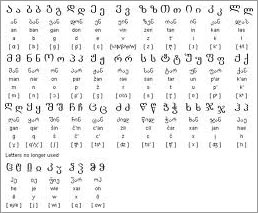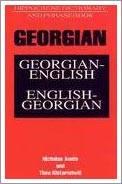Language in Georgia
“Learn a new language and get a new soul.”- Czech Proverb.
Georgian Alphabet
This saying demonstrates that if you understand a person’s mother tongue, then you can truly speak to their heart. If we think of this in terms of ESL teaching, it becomes clear how understanding the nuances of your students’ native language can provide a strong foundation for more intimate and effective teaching strategies. Let’s take a brief moment to consider the languages of the Republic of Georgia.
Georgian is one of the oldest languages in the world. In fact, the very first reference to the Georgian language, a passage spoken by Roman grammarian Marcus Cornelius Fronto, dates back to the 2nd century AD.
The process by which Georgian became a written language was an outgrowth of the conversion of the Georgian upper class to Christianity in the middle of the fourth century. Georgian, as the new language of the national religion, eventually replaced Aramaic, the literary language of pagan Georgia.
Here’s another interesting fact: The Georgian alphabet is one of twenty alphabets in use in the world today.
Georgian words are created by arranging morphemes together, and their meanings change through further inflection. Many students of the language claim that conjugating verbs in Georgia is even more complex that conjugating verbs in French. Furthermore it is difficult to imagine a language that lacks prepositions and doesn’t differentiate between genders. Therefore, it can be a little confusing sometimes as the same pronoun can mean he, she or it.
It is no wonder that Georgian is known for being one of the toughest languages in the world to learn.
[bctt tweet=”The U.S. Department of State’s language service regards Georgian as a tougher language to learn than even Russian.” username=”reach_to_teach”]
Both of these languages are categorized on the same level of difficulty level, a level that demands an average of 1,100 hours of class work in order to achieve an intermediate proficiency level.
Despite the challenges that are sure to be faced when learning Georgian, all teachers with the TLG program will receive a week’s worth of intercultural classes, which include Georgian language classes.
Furthermore, being fully immersed in Georgian culture will do wonders for your ability to learn the Georgian language. Many of our teachers have recommended that you look at the characters of the alphabet and determine in your mind that you are going to learn them. You will be amazed at your own abilities.
Here is a little more information about this beautiful Eastern European language:
Facts About Languages In Georgia
Georgian is the chief language of approximately 3.9 million people in Georgia.
- 83% of the population speaks Georgian
- Georgian is also spoken by roughly 500,000 people that live in places such as Iran, Turkey, Russia, the USA and Europe.
- A total of fourteen languages are spoken in Georgia: Abkhaz, Assyrian Neo-Aramaic, Northern Azerbaijani, Bats, Bothan Neo-Aramaic, Georgian, Judeo-Georgian, Northern Kurdish, Laz, Mingrelian, Osetin, Russian, Svan and Urum.
- Considering the history of this country, it is easy to see why a significant number of Georgian speakers are also fluent in Russian as their second language.
- The Georgian alphabet is one of twenty alphabets in use in the world today. The language originally consisted of 38 characters, but today only 33 characters are commonly used in every day life.
- This language has drawn on three different scripts in its lengthy written history. Today’s script first surfaced in the ninth century, and it is Mkhedruli, which means “cavalry” or “military”.
- Words are written as they sound and sound as they are written.
- Georgian is also unicameral, which means that it has no upper or lower cases for its letters.
Helpful Language Learning Links
Please refer to the following links to learn some basic Georgian phrases:
• A collection of basic useful Georgian phrases
• A helpful Georgian travel phrasebook
Learning a new language can be difficult, but having even a basic understanding of Georgian will not only make your time in Georgia more interesting, but it will also provide you with a window on Georgian culture.

 Georgian is the chief language of approximately 3.9 million people in Georgia.
Georgian is the chief language of approximately 3.9 million people in Georgia.



